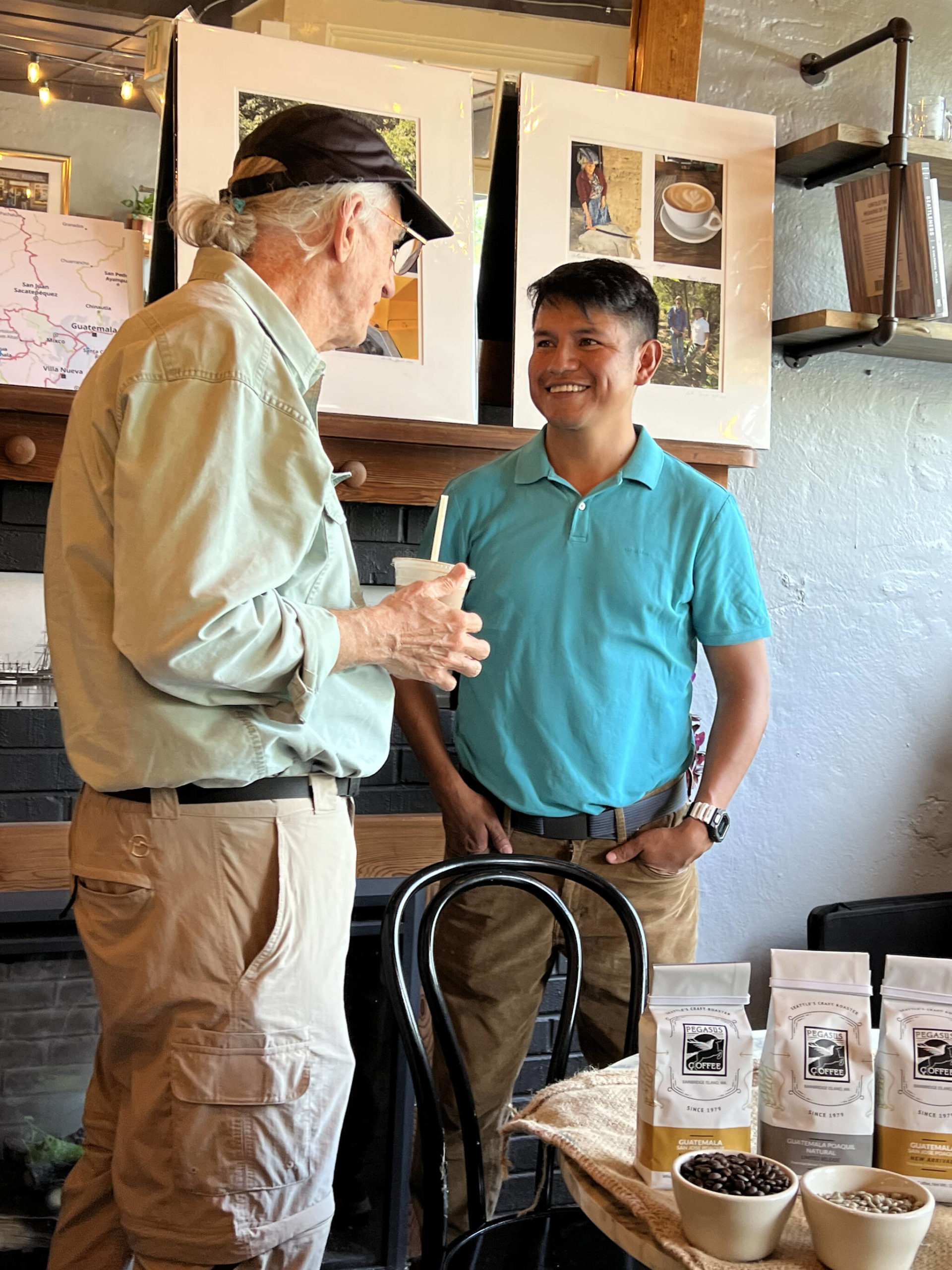“There are 70 steps in order to get a cup of coffee,” said Gerson Morales, co-founder of Cooperativa La Asunción in San Jose Poaquil, Guatemala, which has been exporting coffee to Bainbridge since 2019.
Morales’s family has been growing coffee beans for generations without much notice, until he formed a cooperative to cut out the middlemen.
On Aug. 19, Morales met with coffee lovers at Pegasus Coffee House in Winslow and shared how his company is helping Indigenous farmers export high-quality coffee in a direct-trade arrangement that is creating economic opportunities for people in the mountainous Chimaltenango region of Guatemala.
The 39-year-old studied agriculture his whole life until earning a master’s degree in International Economics and Finance. “I grew up farming, now I do development work.”
Morales highlighted the importance of direct-trade and sustainable farming practices to shed light on where coffee comes from and how consumer demand impacts the lives of Indigenous farmers near the equator.
By developing a close relationship with two coffee roasters in the U.S.—Pegasus and Ethos Coffee in Florida— Morales said his customers are willing to pay a higher price that supports the whole coffee-growing process. “It’s a unique relationship because they recognize that there’s a lot of labor and a lot of work behind every cup and sip of coffee.”
David Adler, Pegasus’ head of Coffee and Roasting Operations, has long been fascinated with the handmade tradition of transforming green coffee beans into a cup of craft coffee. As a scientist and affiliate assistant professor of Pathology at the University of Washington School of Medicine, Adler brings together the science of roasting and brewing good coffee.
He appreciates a great cup of coffee, but more importantly, he cares about the people who labor and care for the beans he roasts. “This is direct trade, and it’s a really unique relationship, which is not true for most coffee farmers in the world. The quality is there, and we can do things to get better prices,” Adler said.
Connections are what propels Morales; it was through his wife that he met Adler. When Morales was studying at Brandeis University he met Bainbridge native Alissa Moen. In 2014, they moved to Guatemala and eventually met Adler on a summer visit to see Moen’s family on BI.
“I brought a suitcase of 25 pounds of beans for David to roast,” said Morales, who was looking for a way to cut out the middleman. Through that connection, Morales established a partnership with Pegasus Coffee.
Fifty percent of the 25-30 member farming cooperative are women, who own and work their own small plots of land to grow high-altitude, organic coffee. The cooperative wants the community to become financially sustainable and also provides health education, mentors, women-owned businesses, and provide opportunities for youth who are leaving the villages for urban areas.
Lack of labor at harvest time is a problem. “There are specific periods of the year that labor is needed for the coffee cycle, and every year it’s getting harder to get people because they are moving to the urban areas, or the younger generations are not interested in working in agriculture,” Morales said.
Morales is trying to find alternatives for the country-wide problem, and he sees that young people could use their talents to support the industry by learning about the science behind agriculture and marketing the coffee to support others.
“It’s not just the labor-intensive work, a lot of things happen behind the growing of coffee. There’s marketing, technology, logistics, and we can get them involved. But, in order to do that, we have to look around and have more capability of doing different things around coffee, and I think we have the potential with this coffee to grow more.”
Morales said Guatemala has a high rate of malnutrition in kids under age 2. By helping them find financial success, they hope to fix that problem. “We want to support families so they can provide better meals for their kids and prevent malnutrition.”
Those not in the co-op yet are becoming more interested in learning about the technology and techniques because they’re seeing their results. The outreach is working as those farmers want to learn more because the price of coffee going up. “We’re doing more organic and being more effective with what we’re doing,” Morales said.
The group recently received a small grant for women to fabricate traditional clothes while creating a year-round cottage industry. “It’s not just coffee,” Morales said, adding 50% of the cooperative members are Mayan-speaking Indigenous women. One subsidiary business that sprang out of the cooperative is a small pig farm. “Everybody plants coffee, everybody loves coffee, but we have to find some other alternatives for the rest of the year.”
Morales’s brothers run a coffee shop and a bakery and his 80-year-old aunt, Octaviana, runs the most successful farm in the co-op.
“The funny thing about Guatemala is, we produce really good high-quality coffee, but we drink the really bad coffee,” Morales said. “We just need to teach ourselves how to appreciate it more and keep it to ourselves.”
Contact: Follow the coffee co-op on facebook.com/coopasuncion/.



